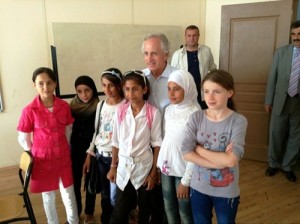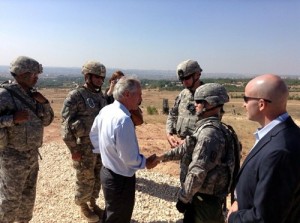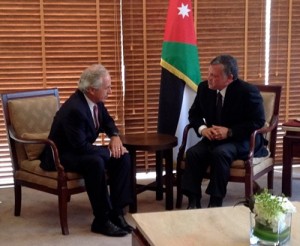
U.S. Sen. Bob Corker, left, a Tennessee Republican, meets with Iraqi Prime Minister Nouri Al-Maliki, second from right. (Submitted photos)
After a week-long trip to the Middle East that ended Saturday, U.S. Sen. Bob Corker said the recent expansion of violence there threatened the region’s security and America’s national interest.
Corker is a Tennessee Republican and ranking member of the Senate Foreign Relations Committee. From Aug. 10-17, he visited with U.S. and foreign officials in Turkey, Iraq, and Jordan. The trip focused on regional political and security issues important to the United States, including the violence in Egypt, the conflict in Syria, and the threat of sectarian violence and terrorism in the region, a press release said.
Corker will be in East Tennessee on Tuesday, with stops in Knoxville and Maryville. He spent the first week of the Senate’s August recess in Middle Tennessee and will be making stops throughout Tennessee this coming week.
The senator discussed his Middle East trip on ABC’s “This Week with George Stephanopoulos” on Sunday.
“The spillover of the sectarian conflict in Syria poses a real threat to Iraq, and the growing humanitarian crisis, including the growing number of refugees and internally displaced persons, increasingly threatens stability in countries like Jordan and Lebanon,” Corker said in the press release. “The U.S. must work with regional partners to return stability to the region and prevent the spread of extremism by supporting moderate, stabilizing forces.”

Corker meets with school-age Syrian refugees who are being taught language and practical skills by other refugees in schools built by the Turkish government.
Corker arrived in Turkey on Sunday, Aug. 10, and met with members of the Supreme Military Council of the Free Syrian Army, including opposition commander Brig. Gen. Salim Idriss. On Monday, he visited with U.S. service members operating the U.S. Patriot missile battery near the Turkish border with Syria. Later in the day, he visited a refugee camp on the Turkish border for the second time since the conflict began, the press release said. At Kilis camp, Corker met with refugee leaders, camp administrators, and a number of individual Syrian refugees.
“Turkey’s efforts to assist the thousands of Syrian refugees seeking safe haven in their country are admirable, and they are in a better position than most of the neighboring countries to handle the overflow,” Corker said. “The refugees there are frustrated by what they see as a lack of support from the international community for the opposition. Efforts to more fully support the Free Syrian Army are coalescing around Gen. Idriss to a degree, but there is much more to do, especially in training and equipping vetted, moderate forces.”

Corker visits with United States service members operating the U.S. Patriot missile battery near the Turkish border of Syria.
On Tuesday, Corker traveled to Iraq for meetings in Baghdad with U.S. Ambassador Robert Stephen Beecroft, leaders from Iraq’s Christian minority, and Iraqi National Security Advisor Faleh al-Fayad, the press release said. The next day, Wednesday, the senator met with Iraqi Prime Minister Nouri Al-Maliki, Deputy Prime Minister Saleh al-Mutlaq, and Chairman of the Foreign Relations Committee Humam Hamoudi. In the Kurdish capital of Erbil, Corker met with former Kurdish Prime Minister Barham Saleh and Fouad Hussein, chief of staff for Kurdish President Masoud Barzani.
“The security situation in Iraq is deteriorating rapidly. The lack of an inclusive governance effort is creating internal tensions, and that, mixed with regional sectarian tensions flamed by the Syrian conflict, is a potent mix that is allowing al Qaeda to have a significant resurgence in the country,” Corker said. “If left unaddressed, these destructive trends will continue to rapidly destabilize the country, and a United States foreign policy that does not recognize this reality will be very problematic for Iraq, for us, and for the region. This is a problem that can’t simply be wished away by the Obama administration.”
In Jordan on Thursday, Corker had a series of meetings with top political and military leaders, including King Abdullah II, Foreign Minister Nasser Judeh, GID Director General Faisal Shobaki and Chairman of the Joint Chiefs of Staff Gen. Mishaal Zaben. On Friday, he concluded his trip with visits to the Za’atri refugee camp, his second since the Syrian conflict began, and the King Abdullah II Special Operations Training Center.
“Jordan is playing an outsized role in the region, and the burden of refugees into the country is taking a heavy toll. At all levels, Jordan is assisting in developing a coherent response to the crisis in Syria,” said Corker. “While U.S. civilian and military personnel in Jordan are focused on the stability of that nation and are improving our capability to assist the vetted, moderate opposition in Syria, I’m very concerned with the slow pace of decisions in Washington regarding implementation.”
A second press release said Corker called for the U.S. to “recalibrate” future foreign aid to Egypt, consistent with America’s national interests, during his appearance on “This Week with George Stephanopoulos.”
“We need to keep the lines of communication open,” Corker said. “I hope we will continue to have an aid relationship with Egypt…I think we need to tier [our aid].  There are certain things that obviously should not flow. There are certain things that are in our national interest that continue to need to flow.”
He pointed to the continued need for Egyptian cooperation to address the threat posed by extremists in the Sinai Peninsula and the importance to the American economy of maintaining the nation’s preferential access to the Suez Canal.
He further noted that while all of the American aid to Egypt has already been committed for this year, the Egyptian military’s “actions of the last week, no doubt, are going to cause us to suspend aid,” which should provide an opportunity for the U.S. “to recalibrate and look at what is our national interest,” the press release said.
In addition, Corker argued that the United States has taken its eye off the ball in the region, noting that “we are not focusing on very important things,” the release said.
“[I]n Iraq, the country is devolving. We have a leader there, candidly, who’s done some of the same things the Muslim Brotherhood has done, and is concentrating power to himself, breaking down democracy. That’s creating sectarian violence.  And then you look at the regional sectarian violence that’s happening in Syria. We have all kind of proxies weighing in there. That is destabilizing the region. It’s happening in Lebanon and Jordan. Twenty-five percent of [Jordan’s] population is going to be Syrian refugees in the short [term]. So I do think that we have a lot of our national interests there that are not being focused on, [particularly] in Iraq, where it’s as if we wished that problem to go away.”






Leave a Reply